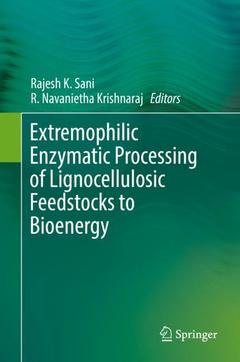Description
Extremophilic Enzymatic Processing of Lignocellulosic Feedstocks to Bioenergy, Softcover reprint of the original 1st ed. 2017
Coordinators: Sani Rajesh K., Krishnaraj R. Navanietha
Language: English
Subjects for Extremophilic Enzymatic Processing of Lignocellulosic...:
Publication date: 07-2017
Support: Print on demand
Publication date: 05-2018
Support: Print on demand
Description
/li>Contents
/li>Biography
/li>Comment
/li>
Introduction.- Fundamentals of enzymatic processes.- Pretreatment of lignocellulosic feedstocks.- Approaches for bioprospecting cellulases.- Extremophilic xylanases.- Lytic polysaccharide monooxygensases.- Recent advances in extremophilic α-amylases.- Extremophilic ligninolytic enzymes.- Extremophilic pectinases.- An overview on extremophilic esterases.- Extremophilic esterases for bioprocessing of lignocellulosic feedstocks.- An overview on extremophilic chitinases.- Extremophilic lipases.- Bioprospection of extremozymes for conversion of lignocellulosic feedstocks to bio-ethanol and other biochemicals.
Rajesh K. Sani is an Associate Professor in the Department of Chemical and Biological Engineering and Chemistry and Applied Biological Sciences at the South Dakota School of Mines and Technology, South Dakota. He joined the South Dakota School of Mines and Technology as an Assistant Professor in 2006. Prior to this, he worked as a Post-doctoral Researcher and Research Assistant Professor at the Washington State University, Pullman, WA, and focused his research on Waste Bioprocessing. He also served as an Associate Director of NSF Center for Multiphase Environmental Research at the Washington State University. He received his BS in Mathematics from the Meerut University in India, his MS in Enzyme Biotechnology from Devi Ahilya University in India, and his PhD in Environmental Biotechnology from the Institute of Microbial Technology in India.
Due to his interdisciplinary background, Sani has been integrating engineering with biological sciences in his teaching as well research endeavors. For over twelve years, Sani has engaged in a constant endeavor to improve his teaching skills to become an effective instructor and communicator. In Washington State University’s School of Chemical and Bioengineering and Center for Multiphase Environmental Research, he taught a variety of engineering courses including Integrated Environmental Engineering for Chemical Engineers, Bioprocess Engineering, and Current Topics in Multiphase Environmental Research - a team taught interdisciplinary course to undergraduate and graduate students. Over the last nine years at the South Dakota School of Mines and Technology, he has been teaching various science and engineering curses including Microbiology for Engineers, Biochemistry Laboratories, Bioinformatics, Molecular Biology for Engineers, Microbial Genetics, and Microbial and Enzymatic Processing to students of various disciplines of Chemical Engineering, Environmental Engineering, A




